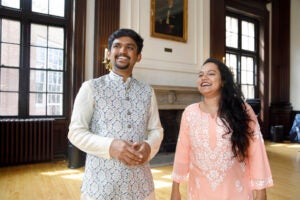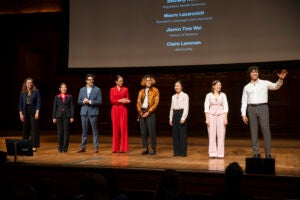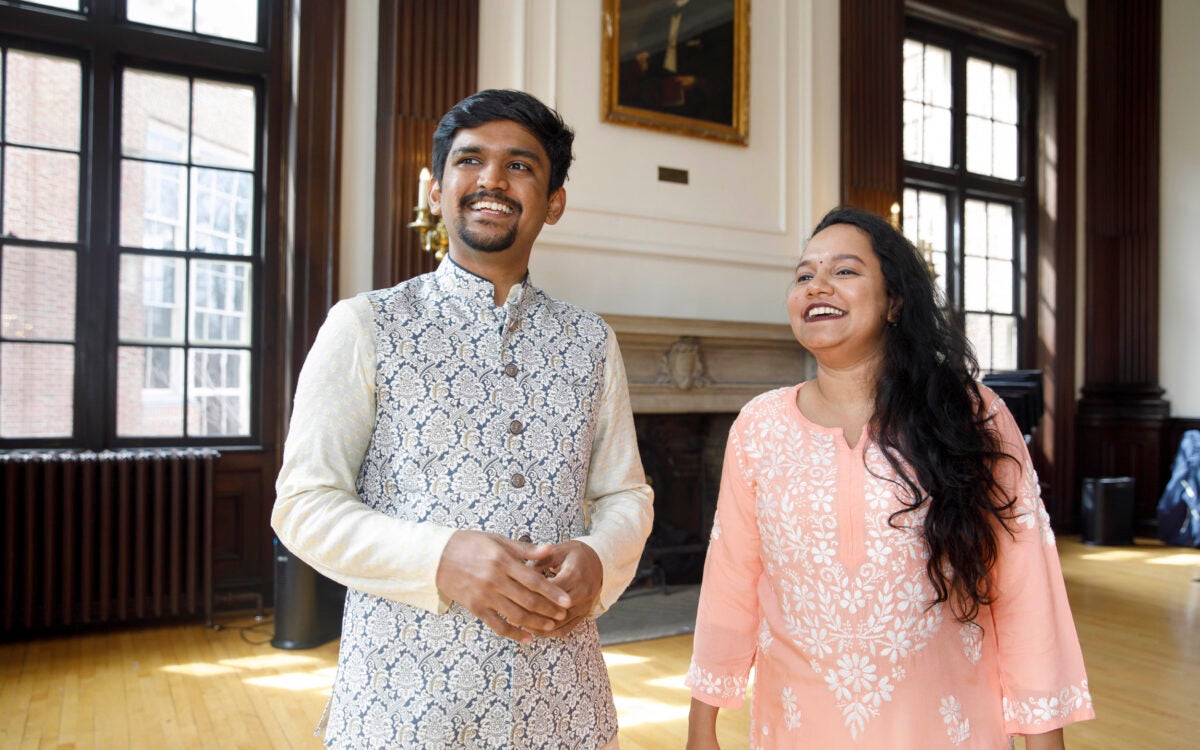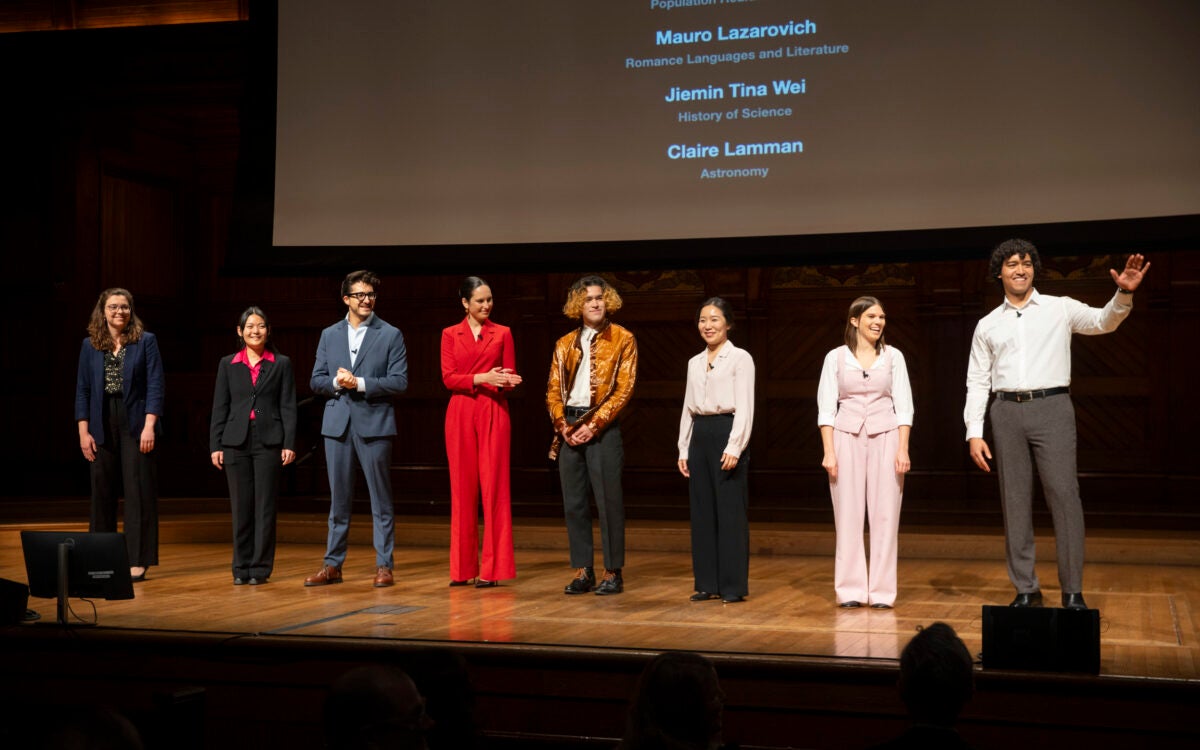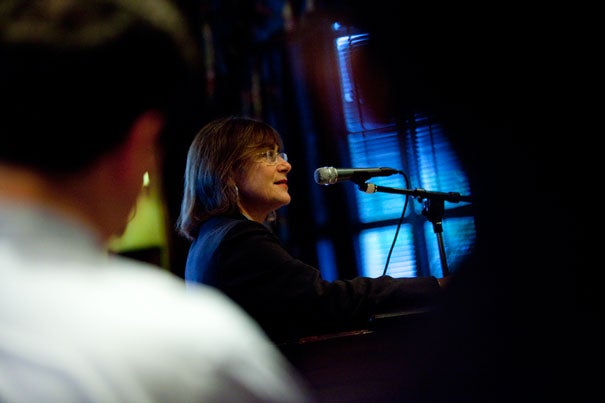
The Scholars at Risk initiative, which provides one-year fellowships for international scholars who face persecution in their native lands, is seeking nominations for 2011-12 fellows. Jacqueline Bhabha (above), the University adviser on human rights education, spoke at an Oct. 12 reception exploring the next phase of human rights scholarship at Harvard.
Stephanie Mitchell/Harvard Staff Photographer
Aiding scholars at risk
Harvard calls for nominations to program
Harvard has just issued its annual call for nominations of international scholars who face persecution in their native lands.
Since 2002, the University has provided one-year visiting fellowships to one or more scientists, writers, or political figures in its Scholars at Risk initiative. They are in danger because of their work, gender, ethnicity, religion, or political opinions.
“The support of American universities for scholars facing the risk of persecution because of their beliefs, scholarship, or identities has always been critically important,” said Harvard President Drew Faust in an Oct. 20 email asking for nominations, “and threats to academic freedom today are no less intense.”
The deadline for nominations is Nov. 9. After that, a faculty committee will choose the 2011-12 fellows. Scholars from any discipline represented at Harvard are eligible.
“The purpose of the fellowship is to enable scholars whose lives have been disrupted to pursue their research interests,” wrote Faust, “and to benefit from the scholarly environment that Harvard can provide.”
The program was established by the President’s Office and by what was then the University Committee on Human Rights Studies. Since then, Harvard has sponsored 22 fellows. The initiative is part of a Scholars at Risk network of 194 universities in 23 countries, and based at New York University.
It was founded in 1999 by University of Chicago legal scholar Jacqueline Bhabha, who now is the Jeremiah Smith Jr. Lecturer in Law at Harvard Law School and the University adviser on human rights education.
Harvard’s first scholar at risk, in 2002-03, was Mesfin Wolde Mariam, a leading Ethiopian geographer who faced imprisonment for his contention that Ethiopian famine was caused by political dysfunction and not natural forces.
In 2006-07, the Harvard program sponsored its first writer, Iranian novelist Shahriar Mandanipour. He was in the program for two years, and now is an associate in Harvard’s Department of English. His bestselling novel, “Censoring an Iranian Love Story” (Random House) was published in translation last year.
“There are people in this world who would tell you: Keep the dream of having a dream,” said Mandanipour, in praise of Scholars at Risk. “They make you believe in fairy tales, even though you have been a writer of hopeless stories.”
Mandanipour is also associated with Writers at Risk, an initiative started last year by Jane Unrue, Harvard expository writing preceptor and Scholars at Risk committee member. Her goal is to make it an official Harvard shelter for important writers facing threats in their own countries.
Harvard’s at-risk fellows have included a Sri Lankan mathematician, a Palestinian physicist, a Turkish psychiatrist, a Rwandan human rights scholar, an Uzbek composer, and an Iranian rights activist and writer.
In 2009-10, Harvard sponsored six scholars at risk, including an engineer from Iraq, a physician from Iran, a legal scholar from Africa, a journalist from Pakistan, a historian from Honduras, and a writer and physician from Burma.
This year, two scholars at risk were named at Harvard, though only one is in residence so far: Bakyt Beshimov, a former Soviet Army officer, senior diplomat, and university president from Kyrgyzstan. He is a visiting scholar at the Davis Center for Russian and Eurasian Studies, as well as at the Center for International Studies at the Massachusetts Institute of Technology.
Any member of the Harvard community may submit nominations for the program. The nomination form and details on the initiative can be found at www.humanrights.harvard.edu.
Nominations should be posted to Angela Allen, Harvard University, Department of Physics, Jefferson 242, Cambridge, MA 02138; or sent by fax to 617.495.0416; or emailed to allen@physics.harvard.edu.
For questions about the fellowship not answered on the website, contact Unrue or committee co-chairs Bhabha or Stephen Greenblatt.

